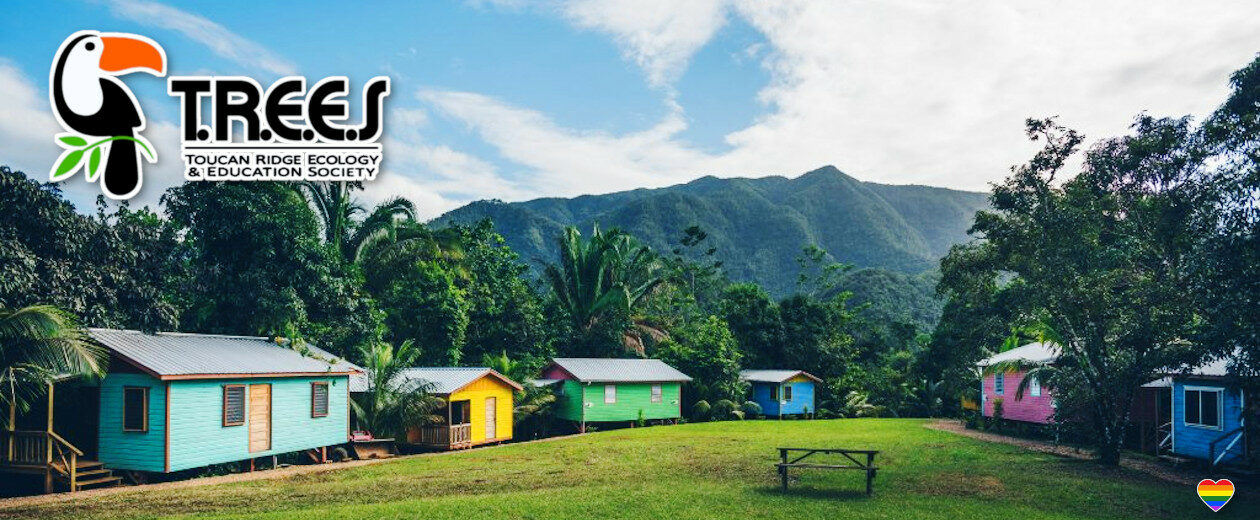Want to learn more about neotropical amphibian and reptile (collectively called herpetofauna, or herps) species, herp census techniques, and herp field work? Want to spend time living and learning about the jungle in the beautiful country of Belize? Want to learn from professional herpetologists? Then this is the internship for you!
The goal of this internship is to give the student various experiences in tropical herpetofauna studies that will aid the student in developing their skills for a variety of future education and employment opportunities. The main component of the project will be to work with Ecorana tutors and T.R.E.E.S staff in establishing long-term herpetofauna monitoring projects (habitat characterization, observational surveys, and mark-recapture specifically for frogs and turtles). These baseline data will contribute to future ecological studies on frog and turtle populations present on the T.R.E.E.S property and elsewhere in the adjacent protected areas in the Maya Mountains.
In addition to the survey work to be conducted at the T.R.E.E.S Hosting Center, the intern(s) will also have the opportunity to visit other herpetofauna conservation projects in Belize and volunteer for a few days on them, including with TIDE in Toledo on their Hickatee radio-tracking project, at the Belizean herpetarium and Belize zoo, and on the Green Iguana Breeding Project in San Ignacio.
We are looking for interns who are independent yet willing to work in a team environment. Applicants should have a certain level of herpetofauna identification skills and should be interested in improving their techniques for proper identification and survey methods applicable in the tropics. Applicants should have a desire for learning about the incredible biodiversity of Belize through systematic field surveys and data collection.
Tasks
- Learn tropical herps by sight and sound in the Maya Mountains.
- Learn and perform a variety of herp surveys that will be most adequate to answer project questions, including: habitat characterization, visual-acoustic encounter surveys along transect lines and as time-constrained search, occupancy modelling methodology, capture-mark-recapture, etc.
- Possibility of learning frog recording techniques.
- Help in establishing a more complete frogs of the Maya Mountains audio CD.
- Work with T.R.E.E.S researchers, international collaborators, and other interns on the development of protocol design and write protocols for continuing field work and data collection.
- Implement protocols in the field using the help of T.R.E.E.S staff and Ecorana tutors to find the best places to set-up long-term monitoring locations.
- Be trained on use of GPS to navigate to and mark survey locations.
- Possibility of mapping frog/turtle habitat using ArcGIS if intern has ability to use ArcGIS software.
- Share knowledge with locals and with other fields.
- Learn to enter data in a systematic manner and compile it into a scientific report with introduction and literature review, methods, results (including basic statistical analysis), and discussion using peer-reviewed scientific articles.
- Complete a short 4-5 page summary report that will help to establish future research protocols.
- Depending on involvement in project, may have opportunity to collaborate on future publications.
Desired Qualifications
- Scientific research and writing skills (be able to navigate through peer-reviewed resources and write a basic literature review).
- Previous experience working with amphibians and/or reptiles in North America (minimum) or in the Tropics (asset).
- Previous experience conducting field work at night (after dark).
- Previous experience working in streams and conducting stream ecology field work.
- Knowledge of herp inventorying and monitoring techniques an asset.
- Be physically fit (spend long hours in the field under often difficult conditions).
- Experience with wildlife recording techniques an asset.
- Experience using Microsoft Office Suite
- Experience using sound recording software, statistical analysis software, and ArcGIS software an asset.
- Flexible easy-going attitude.
Physical Requirements and Work Conditions
- Ability to tolerate high temperature and high humidity
- Ability to work in environments where exposure to spiky plants, toxic vines, scorpions, spiders, ticks and biting flies is common. In addition, it is the jungle; venemous snakes are uncommon but present.
- Ability to live in remote conditions away from electronic ammenities
- Possible indoor work is performed in a typical office setting.
- Ability to lift, carry, and position objects weighing up to 30 pounds.
Benefits
- Gain a working knowledge of herp inventoring and monitoring methods.
- Learn Central American herps by sight and sound.
- Work with herpetologists in a professional setting.
- Opportunity to attend personal/professional development days with local experts on a range of projects.
- Opportunity to live in and enjoy the scenery, wildlife, and cultural resources of a beautiful country in Central America.
- Opportunities to work with other interns, guides and locals from diverse backgrounds that share a common interest in preserving and protecting our natural lands.
Terms
- Multiple positions available
- No application deadline
- Start-date: Mid-January 2015 (but flexible); after first internship, positions available year-round for this continuing monitoring project
- Length of position: minimum 6 weeks; longer is preferable.
- Schedule: 30 hours per week, Monday–Friday.
Fees
Ecorana fees for internships for international students are $25 US/day. This includes lodging and use of all facilities at the T.R.E.E.S Hosting Center, training on methodologies by Ecorana biologists and local T.R.E.E.S professionals in their field of study, as well as mentorship from Ecorana tutors for the duration of the intended internship. International students must have international travel medical insurance during their stay in Belize. At the discretion of the T.R.E.E.S managers, local Belizean students (especially those not staying on site) can have fees reduced or exchanged for work. All interns (international and local) are required to pay for transportation to/from the site and their food while on site (cooking facilities provided).
To Apply
Please email your resume and a thoughtful cover letter to: info@ecorana.ca (international students) OR info@treesociety.org (Belizean students)
Please indicate the position title in your email subject line. No phone calls please.
For more information about Ecorana Environmental Ltd. and their programs, visit: www.ecorana.ca
For more information about the internship center (T.R.E.E.S Hosting Center), visit: www.treesociety.org
